Claude Chabrol’s La cérémonie (1995): Criterion Blu-ray review
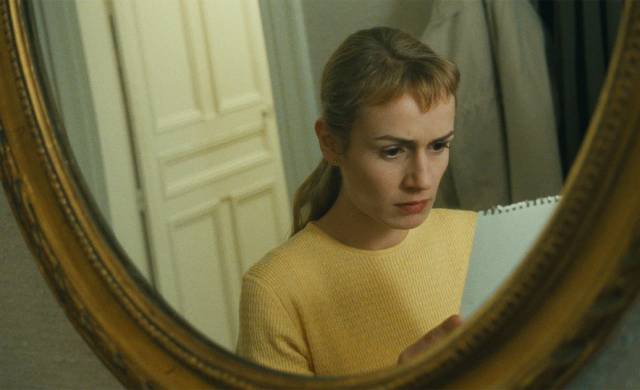
While the French New Wave was a reaction to traditions of filmmaking which a new generation – fuelled by the critics at Cahiers du Cinéma who now turned to filmmaking themselves – deemed stifling and moribund, it was by no means a monolithic movement. The most prominent members varied widely in their approach to finding new ways of using the medium. Jacques Rivette drew on forebears like Louis Feuillade to create long, dreamlike narratives which viewed contemporary society and politics through a surrealist lens; Jean-Luc Godard began by tearing apart narrative form and reconstituting it in ways which forced audiences to change the way they viewed “reality” as cinema perceived it, eventually discarding narrative conventions altogether in order to explore a more radical political landscape. And Truffaut, while playing with form in ways similar to Godard’s early work, had a softer, more sentimental view.
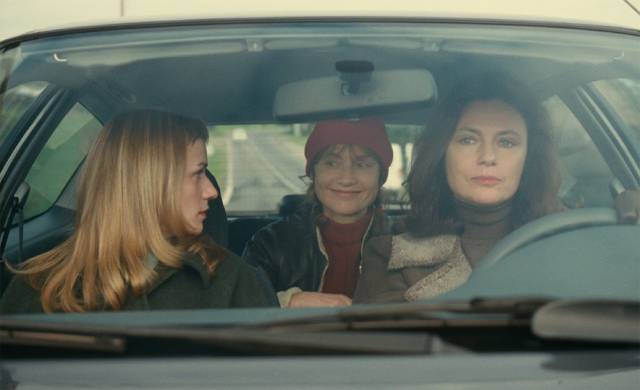
On the surface, Claude Chabrol seemed the least radical of the New Wave filmmakers. His work largely eschewed stylistic disruptions, drawing instead on classical narrative techniques – he was a great admirer (like Truffaut) of Alfred Hitchcock, and was drawn like Hitchcock to moral dramas frequently revolving around ordinary people who find themselves in situations which involve betrayals and murder. In much of Chabrol’s work the driving force is class conflict – bourgeois complacency disrupted by working class resentment. Compared to Godard or Rivette, Chabrol’s films often appear rather conventional, but this is somewhat deceptive, a product of the milieu within which he sets so many of his stories. But unlike Truffaut, much of whose work is also situated among the bourgeoisie, there isn’t a trace of romanticism in Chabrol. He observes with a cool, dispassionate detachment, his films almost clinical studies of social pathology.
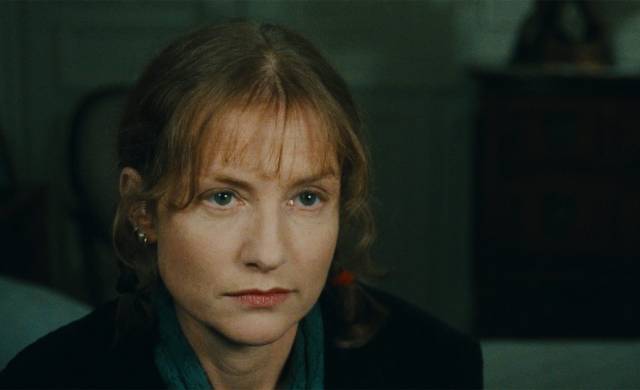
This is nowhere more apparent than in La cérémonie (1995), his forty-fifth theatrical feature. Almost forty years into his career, the film has a paradoxically calm, assured surface beneath which its dissection of class leads inexorably to an appalling explosion of violence, which while shocking seems both inevitable and unavoidable.
Working class Sophie (Sandrine Bonnaire) is hired by the Lelievre family as maid and cook at their remote Bretagne country house. She presents a cool, reserved impression as she’s interviewed by Catherine Lelievre (Jacqueline Bisset) in a cafe, but easily manages to get a higher wage than she earned in her last position. Chabrol immediately establishes an unsettling tone – this first meeting is purely transactional and it appears that from Catherine’s point of view the pending relationship is clearly defined with its employer-employee terms rooted in a predetermined class structure. All of this Catherine takes for granted, but we sense that Sophie is far more aware and is simply playing the part assigned to her.
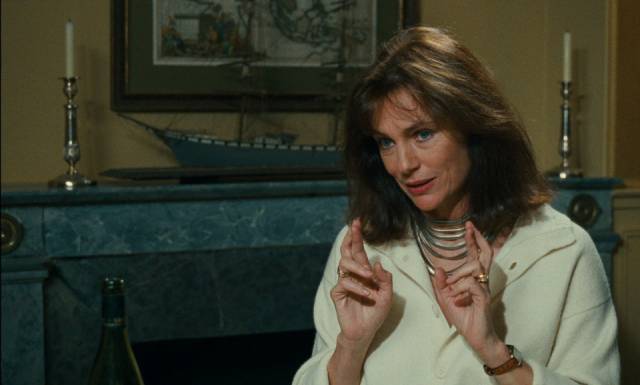
Quiet, hard-working and a skilled cook, Sophie fills her assigned role while revealing nothing of an inner life. To the members of the family – Catherine, her husband Georges (Jean-Pierre Cassel), his daughter Melinda (Virginie Ledoyen), and Catherine’s son Gilles (Valentin Merlet) – Sophie is a kind of fixture, like the dish-washer, her blankness perhaps causing slight discomfort, but her silent presence taken for granted. The moment she’s out of sight, she ceases to exist – she can clearly hear them discussing her qualities in the next room – while she quietly observes them, taking in all the subtle details of their relationships with one another.
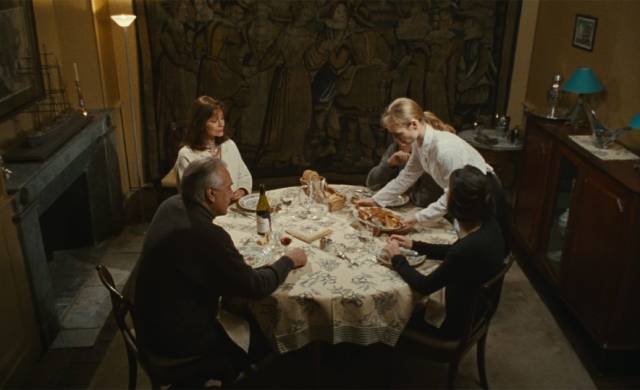
The Lelievres aren’t unpleasant; but their social position – wealthy, cultured – imbues them with a reflexive condescension which makes them strain to be tolerant of the less fortunate. From Sophie’s point if view, this merely emphasizes her own awareness of class differences. We learn quite early that the source of her reserve, and a visible tension, is her illiteracy. The fact that she can’t read produces a complicated mix of shame (an awareness of how her employers would probably judge her) and anger (a pre-emptive response to that judgment). When Catherine leaves a list by the phone and tells Sophie to call the store and order groceries, she’s faced with a dilemma – she walks into the village and goes to the post office where Jeanne (Isabelle Huppert) works. Although she’s only met her briefly – and has heard Georges rant about her as a despicable person – she asks for help.
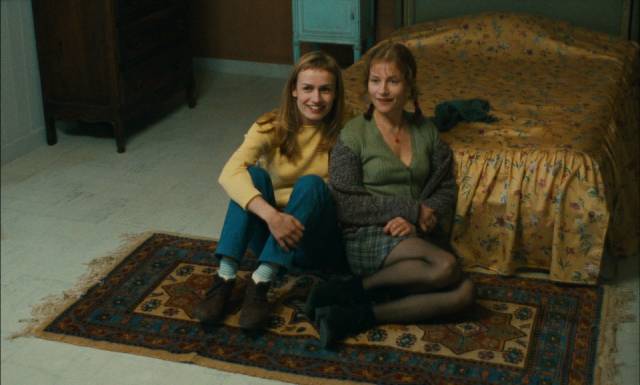
Jeanne knows that Sophie’s story about the phone not working isn’t true, but makes the call; based in a slight deception, this is the beginning of a friendship which gradually amplifies the resentment each woman feels towards the Lelievres and their kind. But in contrast to the contained anger of Sophie, Jeanne is brash and openly contemptuous – Georges’ anger stems from the fact that Jeanne opens everyone’s mail and makes no effort to hide the fact. When Sophie begins to sneak Jeanne into the house to watch television in her room, it’s as much an act of aggression towards her employers as it is a simple gesture of friendship. It’s also the beginning of a more openly expressed conflict.
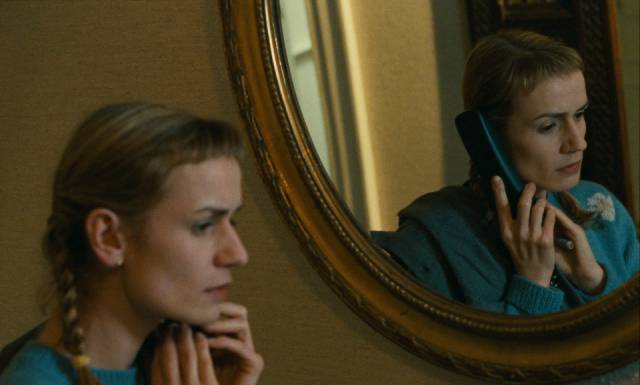
The story takes its irrevocable turn when Sophie listens in to a phone conversation between Melinda and her boyfriend and learns that she’s pregnant. Almost simultaneously, Melinda discovers Sophie’s illiteracy. Her offer to help Sophie learn to read is made with good intentions, but is received as a kind of attack – Sophie threatens to tell Georges about the pregnancy if Melinda exposes her. After this, there’s no going back; the tenuous balance between Sophie and the family is ruptured and inevitably she is fired; threatening Melinda with blackmail has violated all the rules.
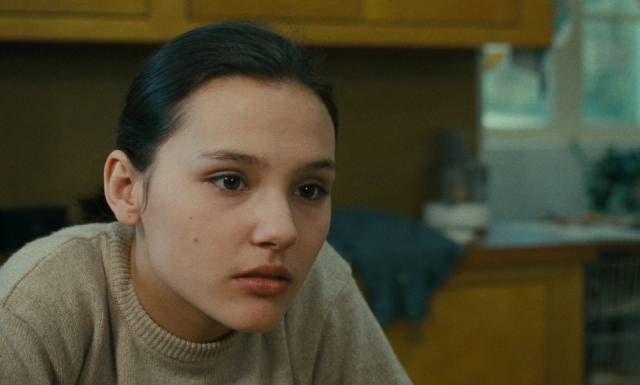
In other circumstances, Sophie might simply have left, but the bond she now has with Jeanne gives her an ally against their mutual class enemies. Sneaking back into the house, the pair gleefully trash Catherine’s wardrobe as the family sit together downstairs watching a performance of Mozart’s Don Giovanni on television. Bourgeois complacency turns out to be no defence against pent up class resentment and a quiet evening at home ends in a chilling explosion of violence, unpremeditated but inescapable.
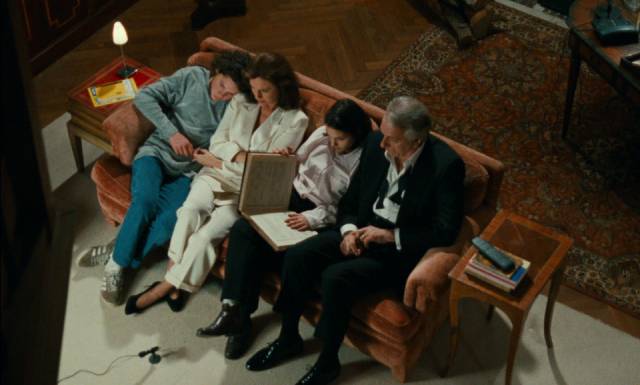
Although Chabrol doesn’t present the bourgeois family as caricatures, or even cast them in a particularly negative light, they are unthinkingly trapped within their class assumptions and unable to see clearly how, and why, they provoke resentment in their “social inferiors”. The performances of Bisset, Cassel, Ledoyen and Merlet are fine, but there’s a kind of weightlessness to them; they live on the surface. Bonnaire and Huppert, on the other hand, are full of a dark energy, lifetimes of resentment and anger which, when brought together, light a fuse which neither women has the means to put out.
Adapted by Chabrol and Caroline Eliacheff from Ruth Rendell’s novel A Judgement in Stone, La cérémonie coolly uses a study of folie à deux to dissect seemingly incompatible class differences. Criterion’s new Blu-ray includes a selected-scene commentary from Chabrol which offers fascinating insight into what seems almost a lack of style; at first glance the film appears quite conventional, but as Chabrol points out the smallest details of framing and camera movement, the care and precision of his technique comes into focus. Just like Hitchcock, he has masterful control over how the viewer takes in what’s being shown, focusing our attention and evoking very specific emotional responses which continuously guide and complicate identification with the characters, nudging us towards an understanding of the motives of the perpetrators, the obliviousness of the victims and the causes of that final eruption of violence.
*
The disk
Criterion’s new 4K restoration has a somewhat problematic greenish hue which makes the colours slightly unnatural, but otherwise the image is clean and detailed, with excellent contrast. The soundtrack is excellent, conveying the significant use made of off-screen sound – overheard voices, music being played in other rooms, and near the end gunshots misinterpreted as car backfires.
The supplements
In addition to Chabrol’s partial commentary (29:03), there’s an introduction by Bong Joon Ho (12:59), a great admirer of Chabrol’s work which he states has been a strong influence on his own style.
A making-of (18:35) from 1995 includes behind-the-scenes material and on-set interviews. There are archival interviews with Sandrine Bonnaire (2020, 12:33) and scriptwriter Caroline Eliacheff (2000, 9:22), and a program in which Chabrol and Huppert discuss the nature of their long collaboration (1998, 22:05) – seven features over three decades.
A brief featurette from the Criterion Channel has scholar Jeff Smith discussing the use of off-screen sound as a cinematic device, with examples from His Girl Friday, The Testament of Dr. Mabuse and Knife in the Water as well as La cérémonie.
Finally, there’s a trailer (1:01) and a booklet essay by Sarah Weinman, an authority on true crime and crime fiction.
Comments
Great review as always. Now I have to get a copy of this film. I was into French cinema back in my laserdisc-collecting days. I collected Criterion laserdiscs as a matter of course and developed an appreciation for French cinema. Un Coeur En Hiver is one of my favorites.
Years ago I went on a big Chabrol DVD binge and eventually hit overload. La cérémonie piqued my interest again, so I’ll start on the Cohen Film Collection triple-disk set as soon as I have the time.